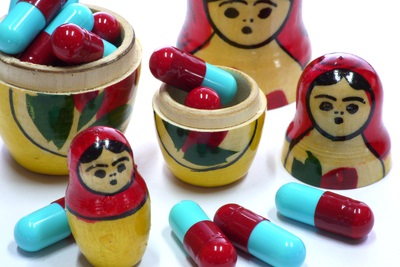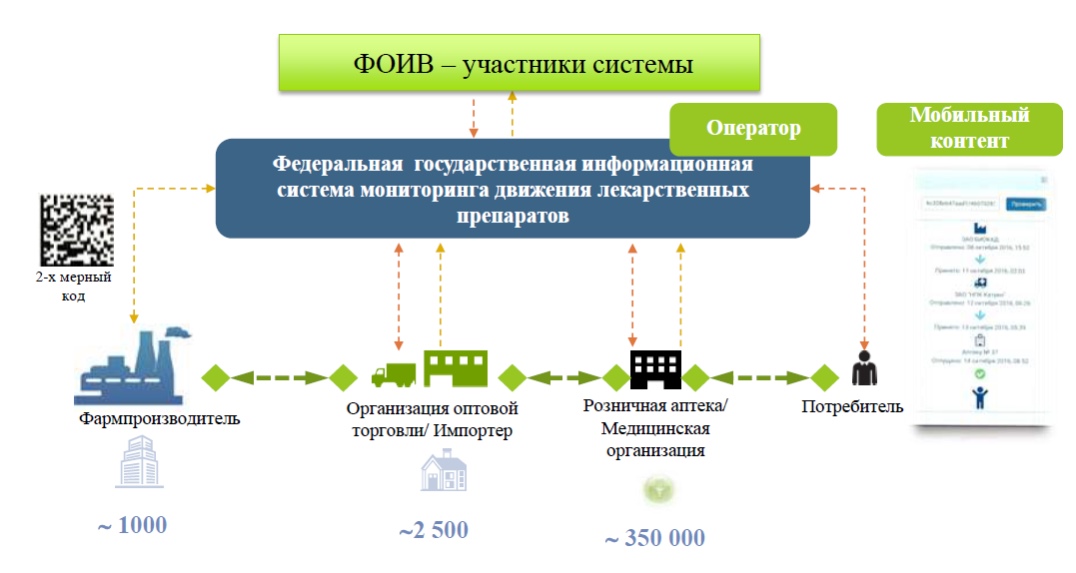
Russia's pharma serialization push is gathering pace, with several big pharma companies and mid-size drugmakers lined up to take part in a pilot.
The pilot programme was proposed last October and signed into law at the end of January by Prime Minister Dmitry Medvedev, and is the latest stage in a pharmaceutical serialization initiative (FGIS MDLP or ФГИС МДЛП) that could become mandatory towards the end of 2018 – although this is not yet confirmed.
The system involves applying unique serialized identification codes to drug products, and capturing and reporting to a central repository key events associated with the those products as they move through the supply chain. It is intended not only to protect the public against falsified medicines but also to standardize and unify accounting procedures and supervision for pharma logistics.
The pilot is intended to determine efficiency and effectiveness of the developed federal repository and tracking system, and will involve the participation of several government agencies including the Federal Tax Service, Ministry of Finance, Ministry of Industry and Trade, and Ministry of Health. It is due to run from February 1 to December 31 this year, with a final report expected by February 1 2018.
According to Iiro Jantunen, chief technology officer at Finnish serialization specialist Servicepoint Oy which is helping a number of Russian companies to meet Russia's requirements, big pharma participants of the pilot include AbbVie, Actavis, Amgen, Astellas, AstraZeneca, Bayer, Boehringer Ingelheim, Roche, Novartis, and Pfizer - either directly or via a local subsidiary.
"The multinationals are doing similar serialization projects already for other markets, and joining the very similar Russian pilot is easy to them," Jantunen told SecuringIndustry.com.
In addition to the bigger players, there will also be medium-sized international pharma manufacturers - such as Gedeon Richter - as well as domestic drug producers such as Biokad, Chemopharm, Microgen and Pharmstandard JSC, he added.
Some of the other elements of the system are starting to become a little clearer, and while data formats and elements are still in flux there seems to be some movement towards compatibility with GS1 standards. It now seems that Russia intends to use 2D datamatrix codes rather than QR codes or RFID as the machine-readable data carrier, in common with the US and EU, although this has not yet been wholly confirmed and is being examined by a Health Ministry working group.
Tamper-evidence not part of the pilot but is going to be part of the final system, although possibly not for the cheapest medicines, according to some reports.

"For the Russian small- and medium-sized pharma, some of those taking part in the pilot have been expecting to get the serialization equipment from Rosatom subsidiary OIC," according to Jantunen. "This seems to be a misunderstanding," he added, noting that the companies must themselves invest in production line equipment and own serialization software.
All told there will be 23 manufacturers, four of the country's biggest distributors, more than 30 medical organizations and 250 retail points participating in the pilot. Initial reports of a phased implementation focusing initially on the top seven high-spending disease classes are now in question, as some commentators suggest this will be replaced by a simple two-stage process with the pilot followed by full implementation.
Jantunen would like to see some elements of the system, such as consumer verification, used more widely.
"The Russian mobile medicine verification app, for back-tracing the medicine package one has purchased through the logistics chain back to the manufacturer, is very useful," he said, pointing to its potential for allowing patients to compare the price of a drug to its official price limit and identifgy which pharmacies have the medicine in stock.
"A similar app should be considered also by the European authorities, for example where customers are using Internet pharmacies and cannot see the verification happening for themselves."
©
SecuringIndustry.com
 | back to top
| back to top







